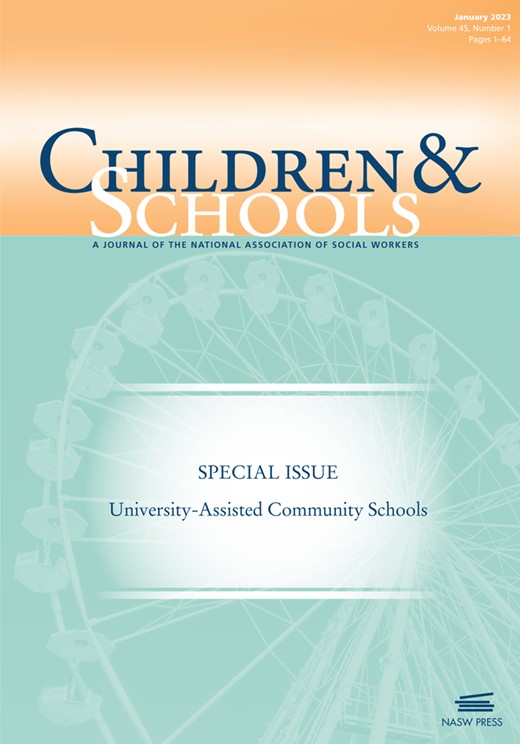The journal Social Work is a benefit of NASW membership. It is available online or, at a member’s request, in print. Children & Schools, Health & Social Work and Social Work Research are available by subscription at a discounted rate for NASW members, either online or in print. Learn more about the journals and subscriptions.
The January 2023 issue of the journal Children & Schools focuses on the specific topic of university-assisted community schools. Here are some of the contents:
Editorial: University-Assisted Community Schools
Community schools are place-based engagement strategies, where multiple organizations and their resources are mobilized around youth, with a focus on academics, social supports, services, and opportunities that lead to improved student learning and well-being, stronger families, and healthier communities. Moreover, community schools are an economically viable way to reduce the negative impact of poverty on children’s ability to thrive. In this new special issue, editors and authors narrow the focus to university-assisted community schools (UACS), a model in which institutions of higher education play an intentional role in community schools by connecting needed resources to school districts, community organizations, and community leaders to democratically engage and mobilize resources around youth.
University–School Partnerships: Successes and Challenges in Designing and Implementing Strategies to Promote Racial Equity
This article outlines the results of a multisite case study with students, teachers, and administrators across two racially and ethnically diverse middle schools in the Pacific Northwest. Using a multisite case study approach (N = 2), authors explored practice challenges and successes in four phases of the research–practice partnership: (1) building the partnership, (2) designing the study, (3) data analysis, and (4) translating the data into action for racial justice.
Canyons Community Schools: Universities and Colleges as Key Partners
Community schools respond to a variety of risk factors that impede student learning and development. School and community leaders in Canyons School District (CSD) have created community schools across one highly impacted feeder pattern to strengthen academic learning efforts, school climate and youth development opportunities, parent and family engagement efforts, health and social services, and community partnerships.
Building a University–School–Community Partnership to Improve Adolescent Well-Being
A university–school–community approach to adolescent well-being may offer innovative strategies to improve and enhance the well-being of adolescents from communities that are underserved. A university–school–community partnership was established to implement innovative health and well-being programming for Indiana youth at a charter school.
University-Assisted Community Schools as Partners in Neighborhood Revitalization Efforts
Urban policymakers, city officials, and community residents utilize neighborhood revitalization initiatives to establish safe and empowered neighborhoods. In 2016, leaders in Columbus, Ohio, launched a neighborhood revitalization effort designed to improve safety, access to opportunities, and economic development in the historically underserved Linden neighborhood. A priority focus involved strengthening Linden schools through the development of two university-assisted community schools (UACS).
Telemental Health for Rural University-Assisted Community Schools
This article presents an innovative telemental health practice model that implements solution-focused brief therapy with social work interns in rural university-assisted community schools (UACS). Implications for policies supporting telemental health in rural UACS, social work education, and evaluation are presented.
Applying an Ecological Systems Framework: How a Historically Black University, a Predominately White Institution, and a Public School System Created a Collaborative Undergraduate Research Experience
Using an ecological systems framework to explore the bidirectional relationships between individual student experiences, peer interactions, university–community connections, and collaboration with a local public school district, this article identifies how an interinstitutional student-engaged research partnership between a historically Black university, a predominately White institution, and a local school district models the power of a diverse and equitable collaboration with each subsystem positively contributing to the realization of social work values and ethics.




